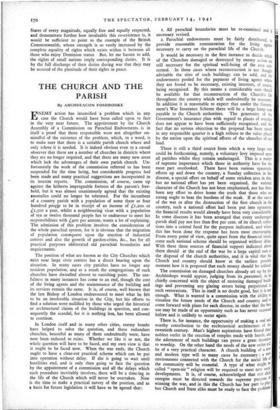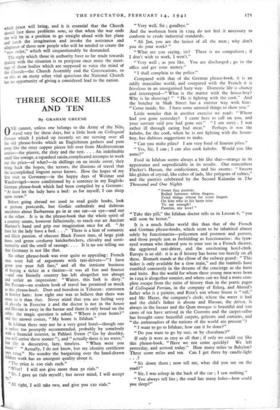THE CHURCH AND THE PARISH
By ARCHDEACON FOSBROOKE
ENEMY action has intensified 'a problem which in any case the Church would have been called upon to face in the very near future. The appointment by the Church Assembly of a Commission on Parochial Endowments is in itself a proof that those responsible were not altogether un- mindful of the existence of the problem, which, in a word, is to make sure that there is a suitable parish church where and only where it is needed. It is indeed obvious even to a casual observer that there are a number of churches in districts where they are no longer required, and that there are many new areas which lack the advantages of their own parish church. Un- fortunately the work of the commission referred to has been suspended for the time being, but considerable progress had been made and many practical suggestions are incorporated in its interim reports. The commission, of course, came up against the hitherto impregnable fortress of the parson's free- hold, but it was almost unanimously agreed that the existing anomalies could no longer be tolerated. For the incumbent of a country parish with a population of some three or four hundred people to be in receipt of an income of £1,200 or £1,500 a year, whilst a neighbouring vicar with a population of ten or twelve thousand people has to endeavour to meet his responsibilities with £400 per annum, wants a lot of explaining. The admission of this problem involves the consideration of the whole parochial system, for it is obvious that the migration of population consequent upon the erection of industrial centres and also the growth of garden-cities, &c., has for all practical purposes obliterated old parochial boundaries and requirements.
The position of what are known as the City Churches which exist near large civic centres has a direct bearing upon the situation. In many cases city parishes have no longer any resident population, and as a result the congregations of such churches have dwindled almost to vanishing point. The use- fulness in many instances has come to an end, though the cost of the living agents and the maintenance of the building and its services remain the same. It is, of course, well known that the late Bishop of London endeavoured to meet what he felt to be an intolerable situation in the City, but his efforts to find a solution were nullified by those who urged the historical or architectural claims of the buildings in question, and con- sequently the scandal, for it is nothing less, has been allowed to continue.
In London itself and in many other cities, enemy bombs have helped to solve the question, and these redundant churches, beautiful as many of them undoubtedly were, have now been reduced to ruins. Whether we like it or not, the whole question will have to be faced, and my own view is that it ought to be faced now. When the war ends, the Church ought to have a clear-cut practical scheme which can be put into operation without delay. If she is going to wait until hostilities end, and is only then going to face the question by the appointment of a commission and all the delays which such procedure inevitably involves, there will be a time-lag in the life of the Church which will never be overtaken. Now is the time to make a practical survey of the position, and as a basis for future legislation it will have to be agreed that: r. All parochial boundaries must be re-examined and if necessary revised. 2. Parochial endowments must be fairly distributed, to provide reasonable remuneration for the living agents necessary to carry on the parochial life of the Church.
It would be necessary in the first instance to decide which of the Churches damaged or destroyed by enemy action are still necessary for the spiritual well-being of the area con- cerned. In those cases where reconstruction is not thought advisable the sites of such buildings can be sold, and the endowments pooled for the payment of living agents where they are found to be necessary, existing interests, of course, being recognised. By this means a considerable sum should be available for that reconstruction of the Church's life throughout the country which will undoubtedly be necessarv. In addition it is reasonable to expect that under the Govern. ment's War Insurance Scheme there will be a large lump sum payable to the Church authorities. The generosity of tht Government's insurance plan with regard to places of worship does not appear to have been sufficiently recognised, and the fact that no serious objection to the proposal has been raised in any responsible quarter is a high tribute to the value placed by the nation upon the spiritual efforts of the churches of our land.
There is still a third source from which a very large sum could be forthcoming, namely, a voluntary levy imposed upon all parishes whilst they remain undamaged. This is a matter of supreme importance which those in authority have for the most part overlooked. There have been various spasmodic efforts up and down the country, a Sunday collection in this diocese, a special effort on behalf of some stricken area in that, but no national effort has yet been organised, the national character of the Church has not been emphasised, nor has there been any effort to drive home the truth that those who are strong ought to bear the burdens of the weak. If at the outset of the war or after the destruction of the first church in the country, such a national effort had been put into operation, the financial results would already have been very considerable. In some dioceses it has been arranged that every undamaged parish shall pay not less than five per cent. of its church collec- tions into a central fund for the purpose indicated, and where this has been done the response has been most encouraging. From every point of view, quite apart from the financial result, some such national scheme should be organised without delay. With these three sources of financial support indicated above there should at the end of the war be a large capital sum at the disposal of the church authorities, and it is vital that the Church and country should know at the earliest possible moment how it is proposed that such money should be utilised.
The commission on damaged churches already set up by the Archbishops would appear, judging from its personnel, to be chiefly concerned with the object of restoring damaged build- ings and preventing any glaring errors being perpetrated in such restorations. This in itself is no doubt good, but it is not enough. What is wanted is a commission with the ability to visualise the future needs of the Church and country and to come forward with plans for each diocese, in order that the best use may be made of an opportunity such as has never occurred before and is unlikely to occur again. There is, for instance, the opportunity of making a real and worthy contribution to the ecclesiastical architecture of the twentieth century. Man's highest aspirations have found their noblest outlet in the erection of temples made with hands, and the adornment of such buildings can prove a great incentive to worship. On the other hand the needs of the new order sa be of a very practical character. A church building of a new and modern type will in many cases be necessary ; a new environment connected with the Church for the social life the community will be essential. A type of what might be called " open-air " religion will be required to meet new social developments. It is, of course, acknowledged that our chid energies must be directed towards the supreme purpose winning the war, and in this the Church has her part to pig, but Church and State alike must be ready to face the problems which peace will bring, and it is essential that the Church should face these problems now, so that when the war ends in a she be position to go straight ahead with her plans and catch the imagination and invoke the assistance and allegiance of those new people who will be needed to create the "new order," which will unquestionably be demanded.
The reply which those in authority have so far made towards dealing with the situation is to postpone once more the meet- ings of those bodies which are supposed to voice the mind of the Church—the Church Assembly and the Convocations, so on this as on many other vital questions the National Church has no opportunity of giving a considered lead to the nation.































 Previous page
Previous page